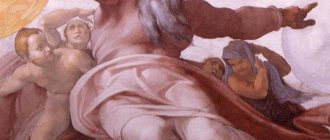Where does God live? The question is often asked by children who have learned about the existence of the Almighty. And they hear a simple answer - God lives in heaven. But adults also wonder where the creator and savior of everything on earth lives. The Bible clearly defines God's "residence" as Heaven. But how is this to be understood? Uncertainty breeds doubt. Human nature craves specifics. Opponents of Orthodoxy take advantage of people's ignorance. They claim that neither the pilots nor the cosmonauts saw God, nor did they see him at home. Which means it doesn’t exist at all. But if you read the Bible not for the sake of reading, but to obtain enlightenment of the mind, heart, and thoughts, the answer will not be long in coming.
What do we know about God
The Savior left few traces on earth. Wandering, enlightening, healing people during his stay in our world, he did not have his own home where the suffering could come and inspect his home. He was not married, did not leave descendants who would tell about his earthly life. He left good deeds preserved in the memory of people. He instilled in our hearts the belief in the possibility of eternal life. He taught the laws that give the human soul peace and joy. These truths are set forth in the book of life - the Bible. And how can he live in heaven if he himself created it? Can a carpenter live in the house he builds before starting construction? The Bible says, “God is spirit.” Therefore, it is obvious that, being a spiritual person, the Lord lives outside the starry sky, the material Universe. This sphere of life is beyond human thought.
Missing people and abandoned village
There is another mystery that worries the area - an abandoned village. People lived in it, worked, and raised children. But one day for some reason they packed up and left their home. People haven't disappeared anywhere. They simply don’t want to talk about this topic, just as they don’t want to go back. Attempts to find out the reasons and motives were unsuccessful.
There are even stranger events. In an area called the Doors of Olympus, lights are often seen in the sky and people disappear. Some manage to return and tell about amazing underground cities.
Does God have a home
The history of the creation of the world describes the process of the emergence of light, darkness, sky, earth, seas, land, and man according to the will of God. It becomes clear that the Creator “lives” both in the center of the Universe and beyond. Therefore, the Temple of His Sanctuary envelops everything that exists on earth, in the Universe. To simplify human understanding of the essence of God, in a number of texts of the Old Testament the Creator calls himself the word “WE”. Making it clear that his strength lies in many manifestations. The Gospel explains the multitude of God by the trinity - God the Father, God the Son, God the Holy Spirit. At the same time, God the Father created the world, sent the Holy Spirit emanating from himself to the Virgin Mary, who gave birth on earth to the only begotten Son of the Father. This diversity is explained by the Creed, the key prayer of Orthodox Christians.
The Father, seeing how people on earth live in captivity of devilish passions and sins, sent his only begotten son to earth. His task is to teach people faith, give hope for salvation, heal souls from sin, and cleanse their hearts. Not everyone accepted the gift of salvation. The execution of Christ, or rather God’s connivance of this event, symbolizes how much the Father loves people, since he sacrificed his son’s earthly life.
Athena
According to myth, Zeus swallowed his wife Metis, who was pregnant with Athena, because he knew that a son from Metis would deprive him of power over the world. After this, he began to have an unbearable headache. By order of Zeus, Hephaestus cut his head with an ax, and Athena appeared in a helmet, with a spear and shield - as she is depicted on the eastern pediment of the Parthenon. Athena is the goddess of wisdom and justice. In strength and wisdom she is equal to Zeus. She defends cities and fortresses, patronizes Greek heroes, and helps them with advice.
Athena built the city of Athens and gave people a sacred tree - the olive. She helps artisans - potters, weavers, and the builder of the Argonauts' ship. Some sources claim that her son was Apollo. A giant statue of Athena, covered in ivory and gold, created by Phidias in the 30s. V century BC, stood in the Parthenon on the Athenian Acropolis.
God's First House
When Jesus left the earth after suffering for the sins of people, his disciples, stunned by what had happened, “looked into the sky like children who had lost their parental protection.” Before leaving, Christ announced that he would go to heaven to his Father, but would return when the time came. And he bequeathed to them to bring faith, hope, love into the hearts and souls of His children - you and me. The house of God is heaven. This is clear from the texts of the Holy Scriptures. But how can an ordinary person realize this truth? Has anyone ever wondered: “If the Creator lives in heaven, how does he see me always and everywhere? How does he know my thoughts, feelings, thoughts? God knows everything through his Holy Spirit who fills the Universe.
People are accustomed to thinking that the sky is a limitless space that can be seen at any time. The Book of Life explains the concept more broadly. The visible sky is only a part of created space. Allows you to see clouds, stars, planets. The invisible sky personifies the omnipresence of God in his revelation, a height inaccessible to human knowledge. Under the Sky one sees a spiritual essence that fills objects—the Earth and other planets—with divine meaning and harmony. All living things develop according to certain laws. Human life, the life of a flower, develops in its own order. The heavenly essence of God is in His concern for the existence of the world in harmony. His eye tirelessly ensures that life proceeds in a lawful order. The Gospel sets rules that allow man to live in harmony with the Universe. By violating the foundations, a person falls into the hands of the devil, who longs for the fall of any soul, “as the smallest sin gives a great reason to destroy the soul.”
The heavenly house of God should be considered as a higher, invisible force that gives a person life and the opportunity to dispose of it for the good of the Creator.
But is the Lord only in heaven? Man is a social creature, craving communication. How to communicate with heaven? The Almighty took care of this too.
Login to the site
Remember, in previous chapters we said that after Jesus fulfilled the ritual part of the Law of Moses, the time for spiritual service had come for believers. Spirituality does not mean performing ceremonies that connect receiving forgiveness with the shedding of the substitutionary blood of sacrificial animals, but turning to God for forgiveness in the spirit, that is, spiritual repentance with the acceptance by faith of the sacrificial Blood of Christ for one’s sins. This is exactly what Jesus was talking about when explaining to the Samaritan woman where, or rather how, true believers would need to worship God:
“The woman said to Him: Our fathers worshiped on this mountain, but you say that the place where we should worship is in Jerusalem...
Jesus says to her: Believe Me , that the time is coming when you will worship the Father , neither on this mountain nor in Jerusalem But the time will come and has already come when true worshipers will worship the Father in spirit and truth , for the Father is looking for such worshipers for Himself” (John 4:19-21,23).
That is, Christ announced that thanks to His mission the time would come when there would be no need to perform ritual actions for the Creator anywhere on earth. There will be no need to worship the Creator either in the Jerusalem temple according to the law of Moses, or on the mountain, as the Samaritans, who also believed in the God of Israel, did. The Creator must be worshiped in spirit and truth. In truth means in following the Word of God, which, as we know, is the truth (see John 17:17). In spirit – means without the material aspect of service. Serving in the spirit does not require temples. Now the earthly Temple of Jerusalem has been fulfilled, incarnated in Jesus , since the entire functioning of the sanctuary was a prototype of the ministry of Christ in the saving plan of “cleansing” people from sins:
“Jesus said to them...: Destroy temple , and in three days I will raise it up. To this the Jews said: This temple took forty-six years to build, and will You in three days ? And He spoke about the temple of His body. When He rose from the dead, His disciples remembered that He had said these things, and they believed the Scripture and the word that Jesus spoke ” (John 2:19-22).
Now the bodies of believers have become temples of God:
“Do you not know that you are the temple of God , and the Spirit of God dwells in you?” (1 Cor. 3:16).
“Do you not know that your body is a temple of the Holy Spirit who dwells in you, whom you have from God” (1 Cor. 6:19, see also 2 Cor. 6:16).
And the house of God, in accordance with the Gospel message, became the church, which, as we have already said, corresponds to the Greek word εκκλησια and means a meeting of believers:
“So that... you may know how you ought to walk in the house of God, which is the church of the living God, the pillar and ground of the truth” (1 Tim. 3:15).
“ We are His house , if we hold fast the boldness and the hope in which we boast, firmly to the end” (Heb. 3:6).
“Where two or three are gathered in My name, there am I in the midst of them ” (Matthew 18:20).
From the New Testament it is clear that churches were called any groups of believers, including those meeting in the home of a Christian family:
“Greet the brothers in Laodicea, and Nymphas, and his house church ” (Col. 4:15, see also Rom. 16:4, 1 Cor. 16:19, Philim. 1:2).
This is difficult for some people to understand. After all, they are accustomed to looking for the Creator in beautiful buildings with crosses and domes, as popular confessions teach them. But let's look at direct biblical texts about the place where God lives . According to the Word of God, the Creator never lived in earthly structures . Even in the Old Testament tabernacle, God did not dwell permanently, but only appeared there above the lid of the ark:
“And the Lord said to Moses ... above the mercy seat I will appear in a cloud” (Lev. 16:2).
“There I will reveal myself to you and speak with you ... over the ark of the testimony, about everything that I will command the children of Israel through you” (Ex. 25:22, see also Ex. 30:6, Num. 17:4).
The Creator promised to be close to the Israelites only on the condition that they fulfill His commandments: “Behold, you are building a temple; If you will walk in My statutes, and do according to My statutes, and keep all My commandments, walking in them, then I will fulfill My word on you, which I spoke to David your father, and I will dwell among the children of Israel, and will not forsake the people. My Israel" (1 Kings 6:12,13). When the Jews broke the covenant with God, He moved away from them. Therefore, the Jews were trampled underfoot by their enemies, and the temple was repeatedly plundered, desecrated and destroyed by the enemies of Israel.
That is, the sanctuary itself was not the place of residence of God, but was only the place of His approach to people, His appearance to them, where He was practically visibly (in the form of a cloud) present among His people, and dedicated to His name . Therefore, the eyes of the Lord were drawn to this place more than to other places on earth. The Creator said to Solomon:
“I have consecrated this temple which you have built, that name there” (1 Kings 9:3).
“And the Lord appeared to Solomon at night and said to him: I... have chosen this place for myself as a house of sacrifice . If I shut up the heavens and there is no rain... and my people humble themselves,... and pray,... and turn from their wicked ways, then I will hear from heaven and will forgive their sins and heal their land. Now My eyes will be open and My ears will be attentive to prayer in this place . And now I have chosen and sanctified this house, that My name may be there ... and My eyes and My heart will be there" (2 Chron. 7:12-16, see also 1 Kings 5:5, 1 Kings 8:17 -20,29,43, 1 Kings 9:7, 2 Chronicles 2:4, 2 Chronicles 6:5,7,10, 2 Chronicles 7:20, Jeremiah 7:10,11-14,30 ).
After building the temple, recognized as one of the most magnificent buildings on earth, Solomon declared:
“Truly, shall God live with men on earth? If heaven and the heavens of heavens cannot contain You, how much less this temple which I have built” (2 Chron. 6:18, see also 1 Kings 8:27).
The Bible says that the true dwelling place of the Creator is in heaven :
“The Lord is in His holy temple , the Lord is His throne in heaven ” (Ps. 10:4).
“ The Lord looks down from heaven and sees all the sons of men; from the throne on which He sits , He looks down upon all who live on earth” (Ps. 32:13,14).
“When Your people are smitten... because they have sinned against You, and they turn to You... and ask and pray before You... then You will hear from heaven , and forgive the sin of Your people" (2 Chron. 6:24, 25, see also above 2 Chronicles 7:14, and also Deuteronomy 26:15, Psalm 102:19, Psalm 114:11, Psalm 122:1, 2 Chronicles 6:27,30,33, 35.39, 2 Chronicles 30:27, 1 Kings 8:30).
The Prophet Isaiah, reproaching the Jews for turning the service of God into formalism, proclaimed on behalf of the Creator:
“Thus says the Lord: heaven is my throne , and the earth is my footstool; where will you build a house for me? (Isa. 66:1).
The New Testament echoes the Old Testament teaching:
“The Most High does not live in temples made with hands... Heaven is My throne , and earth is My footstool. What house will you build for Me, says the Lord, or what place for My rest? Was it not My hand that created all this?” (Acts 7:48-50).
“God, who created the world and all that is in it, being Lord of heaven and earth, does not live in temples made by hands and does not require the service of human hands, as if he needed anything, Himself giving to all things life and breath and everything.” (Acts 17:24,25).
“Whoever swears by heaven swears by the Throne of God and by Him who sits on it” (Matt. 23:22, see also Matt. 5:34).
I think these biblical texts are difficult to interpret in any other way. It seems that after the first reading of them, unnecessary questions should not arise... It is obvious that, according to the teachings of the Holy Scriptures, God does not live in man-made temples, no matter how some representatives of modern popular Christian denominations try to present it.
The first Christians understood this very well. There is no archaeological data or written evidence dating back to the 1st-3rd centuries confirming the presence of temples among Christian communities of that time (we are talking about temples, and not houses of worship, which we will discuss later). On the contrary, there are documents showing the purely negative attitude of the first Christians towards churches as cult religious buildings. This is what famous theologians of the 2nd and 3rd centuries wrote about churches.
Christian writer Marcus Minucius Felix (c. 200), book “Octavius” (chap. XXXII):
“Do you think that we are hiding the object of our worship if we have neither temples nor altars? What temple will I build for Him , when this entire world, created by His power, cannot contain Him? And if I am a person who loves to live spaciously, then how can I enclose such a great Being in one small building? Isn't it better to keep Him in our minds, to sanctify Him in the depths of our hearts? »
Christian scientist Origen (185 - 254), work “Against Celsus” (book VII, LXIII-LXV, book III, XXXIV):
“If the Scythians... cannot stand the sight of temples , altars and images, it does not follow that the reason why we object to these things is the same as theirs... The Scythians... agree on this with Christians and Jews. However, they are driven to this by completely different principles. None of these other groups have an aversion to altars and images on the ground that they are afraid of degrading the worship of God and reducing it to the worship of material things... It is impossible to know God and pray to images at the same time.
Those peoples erect temples and statues to the listed (persons). have already excluded all these things from the area of (our) worship of God. We believe that all this is more befitting of demons, who - I actually don’t know why - were attached to a certain place, perhaps because they voluntarily chose it or because they were forced to stick to it, attracted here by well-known superstitious rituals.
Christian apologist (theologian who defends Christianity against paganism) Clement of Alexandria (150 - 215), work “Stromata” (book VII, 28/1-4):
“It is beautiful and fair not to associate with any place the presence of one who cannot be limited by anything. And aren’t we right when we don’t want to measure the greatness of the one who includes everything in the world with man-made temples in his honor? Indeed, on what basis should the works of ordinary builders be called saints ? Those who ascribed divine greatness to the air and everything that exists beneath it, or rather to the whole world and space, thought little better. ...Idols and temples , erected by simple artisans, are created from inert matter and forever remain lifeless, material and do not contain anything sacred.”
Christian apologist Arnobius (c. 240 - c. 330), work “Against the Pagans” (book 6, chapter 3):
“We (Christians – author’s note) are told that we do not erect temples ... and do not worship ... images.”
Christian rhetorician Lucius Caelius Lactantius (approx. 250 - 325), work “Divine Institutions” (book II, chapter 2):
“Why do you look at walls, wood and stone instead of the place (heaven - author's note) where you believe they (heavenly intercessors - author's note) are located? What is the meaning of temples and altars?
And here is what the pagan writer Celsus (2nd century) wrote about the attitude of Christians to temples, in the book “The Truthful Word” (part IV):
“They (Christians - author's note) cannot stand the sight of temples , altars and images... They avoid building altars, statues and temples ; (instead) a sign (of a common cult) is their agreement about a secretive, secret community.”
Thus, the biblical texts and historical evidence say one thing:
1) temples are not the dwelling place of God;
2) in the I-III centuries AD. Christians did not have churches, but, on the contrary, were opponents of their construction.
https://www.apologetica.ru/kniga/4-4.html
Second House of God
It is no secret for believers that close communication with the Lord is possible in the Temple. The church is another house of God. People come here to communicate with Him, to thank Him, to ask for help, healing, and resolution of problems. Christian rules require regular attendance at the Temple. Participate in services, confess, receive the sacraments.
God is our Father. Therefore, coming to his house is the good duty of every “child”. During his earthly life, the Lord himself commanded to build a “Sanctuary of God” on earth, so that everyone who suffers could come and pray to the Father. And he will certainly hear, help, reassure.
Church life is subject to strict rules. There are rules for being in the Temple. While visiting God, a person experiences a feeling of peace and tranquility. As if he had come to his father’s house and was enjoying communication with a loving parent.
Other people don’t understand why they should visit the Temple every week. I want to get some sleep and take a break from the work week. Great is the power of thought of a person who wants to justify his own laziness. One of the commandments is: “Remember the Sabbath day.” It is unlikely that the Almighty would establish rules in order to torment His beloved children. The church house of God is a place where the Lord protects a person and gives strength.
Many people today are afraid of damage, the evil eye, and stock up on amulets. But in fact, there is no protection more powerful than church prayer. Therefore, the Creator commanded us to visit His house regularly, to cleanse our souls of sins, and to receive the holy sacraments. Because “in the temple of God everything proclaims His glory.”
The Church is the heavenly embassy of the Lord on earth, where every suffering person seeking salvation receives support. While visiting a parent, a person rises above the hustle and bustle of everyday life, prays for troubles, and finds support. But do divine “residences” end there? No.
Level of development of the ancient city
Another favorite place in Greek cities were public baths (therms). Dion was no exception: the columns used to support the pool slabs are perfectly preserved here. Usually they were erected at schools (gymnasiums) or at temples of Apollo the healer. Later, the entire population began to use them.
Heating took place using a special stove that warmed water and air, which then circulated in the voids under the floor. The floor covering was supported by these brick pillars, arranged in a checkerboard pattern.
In addition to this miracle of engineering, a device has been preserved that the Greeks used in the public market when doing control weighing. It is a stone slab with recesses of various diameters. Bronze dishes were placed in them, aligning the edge of the poured liquid with the edge of the dish. If they do not match, woe to the merchant.
Third House of God
There is another house of the Almighty. The closest one available at any time. This is the human heart. Through the Holy Spirit, God desires to live in the heart of every person. And if the latter asks the Creator to enter his heart, He happily fulfills the request.
God is difficult to know with the mind, but easy to feel with the heart. Other people are interested in: “How can I understand that God is in the heart?” The answer to the question is simple - the presence of the Lord in the heart shows conscience. It is she who explains the postulate of the New Testament - “blessed are the pure in heart.” A person's conscience remains with him constantly. It is she who speaks, sometimes shouts about unrighteous deeds, thoughts, desires. It deprives you of peace and encourages correction.
The heart house of God is based on man’s original orientation towards a righteous life. By succumbing to external circumstances, temptations, and sins, people lose their invisible connection with the Creator. But conscience always manifests itself as a guide to the right path. Therefore, being “at odds” with their conscience, people suffer, suffer, and get angry. In this way, the Lord helps a person to realize his mistakes and encourage him to search for ways to correct and heal the soul.
Hermes
Hermes, the son of Zeus and the mountain nymph Maya, was born in a mountain cave. Just three hours old, he killed a turtle and made a lyre from its shell. After this, he stole a herd of cows from Apollo. Zeus ordered their return, but when Apollo drove the hidden herd out of the cave, Hermes began to play his lyre. The wondrous sounds produced by this musical instrument captivated Apollo, and in exchange for the lyre he gave Hermes his cows. From infancy, Hermes was distinguished by extraordinary cunning and dexterity, so that he was even considered the patron saint of trickery. Hermes is the messenger of the gods, the patron saint of travelers. He is a mediator between gods and people. Hermes was revered by the traveler, the speaker, the merchant, and even the thief. The messenger of the gods, Hermes, was depicted wearing golden winged sandals and holding a staff in his hand.
Where to look for God
The Old and New Testaments describe the dwelling place of God as His all-encompassing presence - around everything that exists and inside every person. So where does God live? Very far away, invisible. At the same time, it’s very close, you can feel it every second. Every person will find Him always and everywhere, turn to prayer and receive a response to a sincere heartfelt message.
You can find God in your heart. You just need to listen to the response of your conscience to your deeds, actions, and thoughts.
The author of the video will tell you in more detail where God lives:
Read about ancient myths about the creation of the world at the link.
Mount Olympus
From a distance it resembles a huge stone flower with open petals. This mountain range has four famous peaks: Mytikas, Skoglio, Stefani (Throne of Zeus), Skala. The highest is Mytikas (2918 meters). This area, despite the presence of a military radar of the Greek armed forces, is open to tourists. Where the gods lived, people have now settled and established an excellent infrastructure. In addition to them, foxes, mouflons, and hedgehogs live and feel great on the mountain.
Mighty coniferous forests, murmuring waterfalls with crystal clear water - this place with its amazing energy attracts tourists. But besides the magnificent nature, wonderful ski resorts, boarding houses, there is another attraction that the Greeks are so proud of - the monastery of St. Dionysius. It is still active. At one time it was the center of Greek Orthodoxy and enlightenment. A cave has been preserved - the monastery of St. Dionysius, where he spent several years.
The Greeks themselves had an unspoken rule prohibiting climbing to the peaks of Olympus for fear of angering its owner.
List
Traditionally, the Olympic gods include twelve gods, mainly from the third and fourth generation of divine beings “titans” described in Greek mythology, the so-called “Twelve Gods” (Δωδεκάθεον). At the same time, the composition of the “twelve” was not canonical in ancient Greek theology. Depending on local cults, the composition of the twelve-member pantheon changed. In particular, at different times there were twelve, thirteen, and fourteen such gods.
In addition to the twelve Olympians, there were many other different cult groups of twelve gods in ancient Greece. The earliest evidence of Greek religious practice involving twelve gods appears no earlier than the late 6th century BC. e. According to Thucydides ( Thucydides
, History of the Peloponnesian War. VI, 54:6-7), was installed on the Athenian agora by Archon Peisistratus the Younger (son of the tyrant and Archon Hippias and grandson of the tyrant Peisistratus) c. 522 BC e. The altar became the central starting point for measuring the distance from Athens to places of worship and refuges.
The Olympians included the children of Kronos and Rhea (called Kronida):
- Zeus is the supreme god of the ancient Greek pantheon, the god of thunder and lightning.
- Hera is the wife of Zeus, the patroness of marriage and family love.
- Poseidon is the god of the sea and brother of Zeus.
- Hades is the ruler of the Kingdom of the Dead and brother of Zeus.
- Demeter is the goddess of fertility and agriculture.
- Hestia is the goddess of the hearth.
And also the descendants of Zeus:
- Athena is the goddess of wisdom, justice, sciences and crafts, as well as military affairs. Patroness of cities and wisdom, daughter of Zeus.
- Persephone is the goddess of spring, queen of the Kingdom of the Dead, wife of Hades.
- Aphrodite is the goddess of love and beauty.
- Hephaestus is the god of fire and blacksmithing.
- Hermes is the god of trade, cunning, speed and theft, as well as eloquence. Patron of travelers.
- Apollo is the god of light, patron of the arts. Also a healer god and patron of oracles.
- Ares is the god of war.
- Artemis is the goddess of hunting, the patroness of all life on Earth, the daughter of Zeus.
- Dionysus is the god of winemaking and fun (in the list of 12 Olympians he supplanted Hestia).
Hera
Wife of Zeus, chief of the Goddesses of Olympus. She patronizes family ties, preserves family relationships, and helps women during childbirth.
Hera is also the daughter of Kronos and Rhea
When she was still a girl, Zeus fell in love with her, and so that she would pay attention to him, he turned into a cuckoo, and Hera caught her. However, in her family life she experienced painful jealousy of her husband, who satisfied his sexual hunger with both goddesses and earthly women
She constantly sent disasters and misfortunes to her husband's mistresses.
Hera is the beauty of beauties. Every year she bathed in magical springs to become a virgin again. The Goddess was depicted as a stately and noble lady, with a diadem or crown on her head, with a cuckoo or peacock, sometimes with the head of a horse.
Dionysus
God of vegetation, viticulture, winemaking and fun. Dionysus is the son of Zeus and Semele, the daughter of the Theban king. On the advice of the jealous Hera, Semele asked Zeus to appear to her in all his greatness. Zeus did so, but the lightning of the thunderer incinerated Semele, and he barely had time to snatch the premature Dionysus, who was born to her, from the flames. Zeus sewed the baby into his thigh, and at the appointed time he unfastened the stitches, and Dionysus was born. He went through many trials before achieving fame. Dionysus gave people strength and joy. He walked all over the world, from country to country, and was constantly accompanied by a crowd of dancing and singing maenads and satyrs.
Pan is the son of Hermes and the nymph Dryope. He was born with goat legs, horns and a long beard. Pan did not want to live on Olympus, but went to the mountains. There, among the forests, he grazes herds and plays the sonorous pipe. Pan is the god of the forest, fields, the god of shepherds, protecting the flocks. He is an indispensable companion of the god of wine Dionysus.
Hermes
Even the gods of Olympus were no strangers to deceit and deceit. One very handsome, judging by ancient images, a god named Hermes was known as a famous cheat and thief. He was born to the Maya galaxy from Zeus. Being just a baby, Hermes committed his first theft - he stole 50 cows from Apollo. After a good “bashing” from dad, the kid pointed out where he hid the cattle. True, subsequently Zeus more than once turned to the clever child to carry out his orders. One day he asked Hermes to steal a cow from Hera: Io, the beloved of the Thunderer, turned into her.
Hermes is very inventive: he invented writing, patronizes trade and banking, astrology, alchemy and magic. He conveys “important” messages to people from the gods through dreams. Hermes is young and efficient. He showed signs of attention to Aphrodite, but she rejected him. Hermes has many children, as well as lovers, but no wife. In fine art and sculpture he was depicted wearing a hat with wings and winged sandals.











